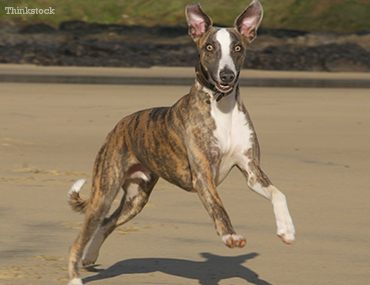Background:
Bred from the Greyhound and smaller vermin hunting terriers, the Whippet was a dog for the working class English man. The original Whippets were probably Greyhounds who were too small for hunting. The peasants (who weren’t allowed to hunt for sport), used Whippets to kill rats and other pests. Over time it became popular practice to gamble on how much small game a whippet could “snap up.”
Later, when mill operators came from England to Massachusetts they brought their Whippets with them. During the industrial revolution Whippet racing was established and quickly gained popularity. It started when Whippet owners noticed their dogs would chase a rag just as they would chase a rabbit. After that, the Whippets would be held at one end of the track while their owners stood at the other end waiving a rag. When the dogs were released the race had begun. Whippet racing has never been taken as seriously as Greyhound racing, but it’s still a sporting event today.
The Whippet was recognized by the American Kennel Club in 1888.
Sizing up:
- Weight: 25 to 35 lbs.
- Height: 18 to 22 inches
- Coat: Fine, dense, short
- Color: Solid black, blue, brindle, fawn, red, sable, tan, white
- Life Expectancy: 12 to 15 years
What’s the Whippet like?
The Whippet will be an excited and rambunctious puppy. He’ll run dig and play at every opportunity. Because he’s a sight hound you’ll need to keep him behind a fence. He’s likely to notice things that you don’t and could easily dart into traffic.
After three years the Whippet will settle into adulthood and should be an excellent housedog. Despite being bred as a runner he’s perfectly content to sleep most of the day away, or watch a movie marathon with you. The Whippet doesn’t like the cold although he can certainly play in the snow from time to time.
The Whippet is likely going to form a bond with one family member more than the others.
As an adult he’s polite and very easy to manage, giving you a gentle nuzzle when he needs to go outside or wants attention.
Health:
Whippets are generally healthy and have a low occurrence of hip dysplasia. No breed is immune to disease but the Whippet does not have a high incidence of genetic conditions.
Takeaway points:
- The Whippet has been compared to a cat by many owners: quiet, well behaved indoors, and likes to curl up on the couch for a belly rub.
- The Whippet will be a rambunctious puppy, and this could last as long as three years.
- The Whippet will chase down any small animal he notices. A leash is always a good idea.
If you have any questions or concerns, you should always visit or call your veterinarian – they are your best resource to ensure the health and well-being of your pets.
